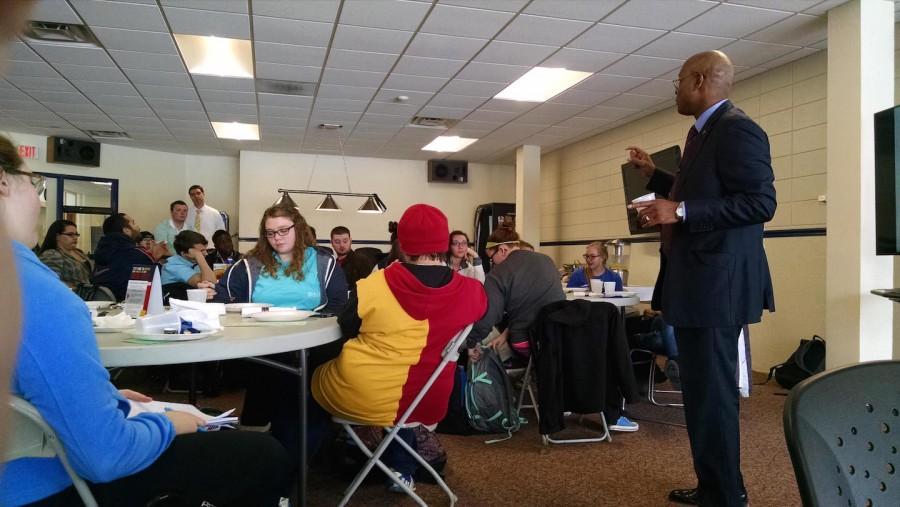Grad school Lunch & Learn well attended
February 21, 2016
The latest AT&T Lunch & Learn, held Thursday, Feb. 18 in the 1862 Lounge, was a bit different from past events.
Most notably, there were far more than the typical amount of students in attendance.
Also, at the start of the event, Eric Blacknall, associate vice president for student success and dean of students, spoke briefly about the history of the Lunch & Learn and then introduced Julie Roberts from AT&T, who presented Blacknall with a check for $2,000 in recognition of the partnership between the school and the company, showing their contribution to these events.
The graduate school presentation then began, with Ann Penke, director of library services, discussing all the available resources the library has to offer to those who are interested in graduate school.
Some of these resources include books on reserve to prepare for graduate school exams, as well as online tests and information.
One such online source through the library is “Learning Express,” through which practice tests for various graduate school entrance exams can be found. A unique feature of this resource is that the tests are designed to mimic the time restriction and material that would be covered in a real testing situation.
“The more practice you get taking these tests, the better you will do in the long run,” said Penke.
Blacknall continued the presentation and said, “It is extremely important” for those thinking about graduate school to “start working on a plan as soon as possible.”
He then spoke about the different types of degrees a student could get through a graduate or professional school, including master’s and doctoral degrees, which are offered through a graduate program, or advanced degrees, in fields like medicine, business or law, which would be obtained through a professional school.
When considering postgraduate education, Blacknall pointed out that for some it is necessary. Some professions require an advanced degree, while others seek such a degree to make more money, and some do it for job security.
“Think about it in terms of numbers,” said Blacknall, as those with higher degrees tend to get paid more and have more and better options concerning employment. Blacknall pointed out only six percent of working adults in the state of Wisconsin have master’s degrees, offering these the “opportunity to be almost unemployment proof.”
A part of the presentation of particular importance to any student was the slide titled “How do I get in?” The key points to follow were: “know what you want to study, know where you want to live, identify five schools you want to attend, learn the admissions requirements, take the GRE, GMAT, or LSAT [and] apply.”
Shifting gears, Blacknall talked about what a student will need to stand out among applicants.
“You’re going to find when it comes time to compete [with others], they’re getting good grades,” said Blacknall.
Additionally, Blacknall said, “letters from professors become important” for acceptance not only into a school, but into the environment of the school, as well.
Ideally, a student should ask a professor with whom he or she has had three classes with, so they know the student personally, and that at least two letters of recommendation are needed to “be a highly successful candidate,” said Blacknall.
Adding some advice, Blacknall said if a student is not a good test taker, “now is the time to practice” and that “none of this [preparation] matters if you don’t apply.”
The presentation next focused on means of paying for graduate school, including the highest level of academic assistance, a fellowship, which is free tuition, plus a stipend. A teaching assistantship, which is also a waiving of fees and a stipend, provides the opportunity for one on one work with a professor, something that “could be extremely important in [a person’s academic] development,” said Blacknall.
Other financial opportunities included a research assistantship, which typically includes a waiving of fees and a stipend or scholarships and loans.
Regarding scholarships, Blacknall suggests identifying “a bunch of them, not just at the college” you are going to attend. This money that a student can get on his or her own “does not necessarily have to be applied to the [tuition] bill,” it could “be yours” to use as you wish, said Blacknall.
Concerning avenues of graduate education, Chloe Reed, junior Spanish major, asked, “What if I wanted to obtain my master’s degree” abroad?
Blacknall said, “Make sure you’re working on a dual track” to make sure it would be recognized in the United States, should a student return for employment.
There are many options and means of graduate education for students to explore, some of which were discussed in the brief presentation.
To access “Learning Express,” students can go to www.lakeland.edu/library, click on “Databases Find Articles” and then select “Learning Express.” This will take students directly to the site where they can then register and begin taking practice tests.
Students are encouraged to go to the library for more information. “We’d be delighted to help,” said Penke.
Further information about graduate schools or any associated questions can be directed to the Student Success and Engagement team.


